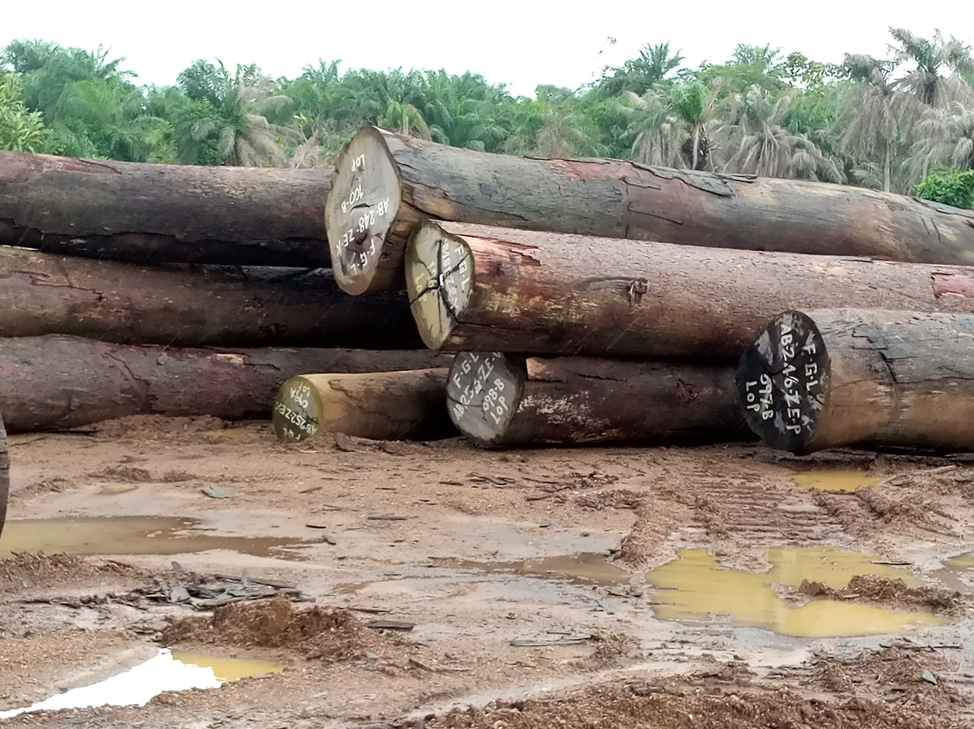Top: Some of the woods were at the center of a legal battle between the Forestry Development Authority and Renaissance Group Incorporated. Photo credit: Civil Society Independent Forest Monitors (CSIFM)
By Gerald C. Koinyeneh
BUCHANAN – The Second Judicial Circuit Court in Grand Bassa has ruled in favor of a Liberian-owned company to continue logging activities in its concession area in the county, following a fierce 15-month legal battle with the Liberian government.
Renaissance, Inc. had sued the Ministry of Justice, the Forestry Development Authority (FDA), and its board of directors for double jeopardy over their decision to halt the company from carrying out logging activities in its concession, known in the logging industry as Timber Sale Contract Area Two (TSC A02) in Compound One, Grand Bassa County after it was already fined for violating the agreement.
In his ruling, Judge Zuballah Kizeku affirmed the unanimous verdict of Liable brought down by the six-man jury which pointed out that the FDA had already imposed an administrative penalty of US$105,000 against the company for violating the contractual agreement and there was no need for further punishment.
“This court decides not to disturb but to uphold, affirm and confirm the unanimous verdict of Liable brought down by the trial jury against the … respondents. Hence, the said respondents are hereby adjudged liable to petitioner with costs ruled against the said respondents.”
In 2021, a report by a group of civil society organizations (CSOs) found Renaissance, Inc. and its partner, Freedom Group Liberia (FGL) harvested logs worth US$2.475 million outside TSC A02.
CSOs had called the company’s illegal operation, “represents a huge breach of the law and points to a disturbing trend of irregularities and non-compliance with the forest laws of Liberia. “The evidence points to a huge loss of revenue to the state and to communities. This must be remedied, and communities must receive the full benefits they have the right to.”
It was co-authored by the Sustainable Development Institute (SDI), the Independent Forest Monitors (IFM) and the National Union of Community Forest Development Committee (NUCFDC) in a consortium called the Independent Forest Monitoring Coordination Mechanism. Its work was funded by the European Union, the United Kingdom and the Ministry of Foreign Affairs of the Netherlands.
Following the release of the report, the FDA imposed US$105,000 on the company as the condition for exporting the log, which it paid.
But just as the company was about to begin the exportation of the logs, the Ministry of Justice ordered the FDA and its Board to halt the company’s operation pending a new investigation into its alleged illegal operation.
The company had said the Ministry of Justice’s decision left the logs lying in the forest for over two years, thereby devaluing their market value, according to court filings.
The company also argued that the Ministry’s action in stopping it from exporting the logs amounts to double punishment, something it said violates its constitutional right. The Constitution of Liberia prohibits subjecting a person to double jeopardy, the legal phrase for trying someone twice for the same crime.
It then called on the court to rule in its favor to allow it to resume operation and ship the logs.
“Wherefore and in view of the foregoing, petitioner petitions your Honor and this Honorable Court to declare the right of the petitioner in keeping with the laws of this Republic,” the company, through its lawyer Jimmy Bombo, told the court at the time.
The defendants had called on the court to dismiss the charges brought against them. They, among other things, said the company has no legal standing to sue them because its article of incorporation was invalid.
They accused the company of presenting an article of incorporation that was different from the original article it submitted to the FDA before it was awarded the contract. They claimed the company and its partners, with two shareholders and its Board of Directors, harvested timber outside of its concession and an investigative panel sanctioned by the Ministry recommended the payment of US$1.745 million.
On the issue of double punishment, the defendants had argued that the company did not suffer any form of double jeopardy as it claimed because it was not indicted, prosecuted or convicted in any court of competent jurisdiction.
But the court rejected that argument, ordering the company to resume operation and sell the logs. It sanctioned the company to sell the logs in order not to lose its monetary value amid the FDA’s decision to appeal the judgment.
“The Court finds it just fair, equitable in the best interest of both parties to order the sale of the logs, subject of these proceedings, and any monetary proceeds therefrom be put in an escrow account for the protection of the future interest of the prevailing party, if applicable.”
The court ordered the FDA, the regulator of the forest sector, to appraise the monetary value of the logs, and called on the company to designate a suitable buyer all under its supervision.
The court also instructed a reputable bank in Liberia to open a special escrow account in its (court) name to deposit the proceed from the sale of the logs.
The court’s ruling is a huge blow to the FDA in its bid to stop the company and its partners from operating under TSC-A2, issued in 2009 for just three years but remains active nearly 10 years after its legal expiration date. In March last year, TSC A02 and six others in Grand Bassa, Gbarpolu, Bong, and Grand Cape Mount were finally canceled.




